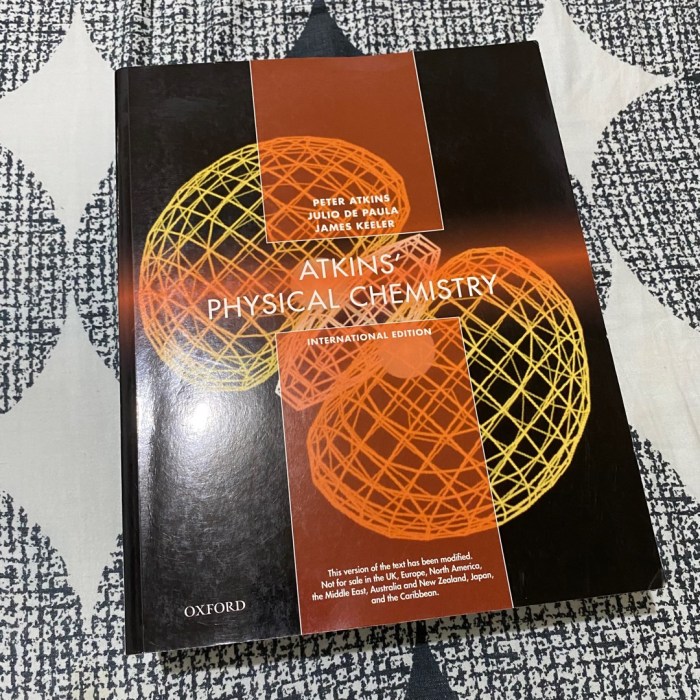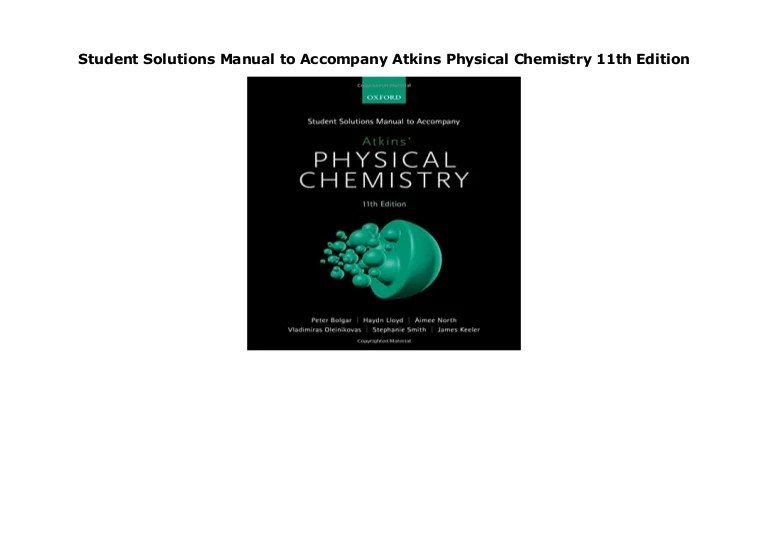Atkins Physical Chemistry 11th Edition embarks on a captivating journey into the realm of physical chemistry, elucidating its fundamental principles and their myriad applications across diverse scientific disciplines. This comprehensive text serves as an invaluable resource for students, researchers, and practitioners seeking a deeper understanding of the intricate workings of the chemical world.
Delving into the depths of physical chemistry, this edition masterfully unravels the laws of thermodynamics, quantum mechanics, and kinetics, providing a solid foundation for comprehending the behavior of matter and energy. It delves into the intricacies of spectroscopy, electrochemistry, and surface chemistry, equipping readers with the tools to analyze and manipulate chemical systems.
Physical Chemistry Concepts

Physical chemistry deals with the study of matter and energy at the molecular level. It examines the fundamental principles that govern the behavior of matter, including its structure, properties, and interactions.
Physical chemistry has a wide range of applications in fields such as materials science, environmental science, and medicine. It plays a crucial role in the development of new technologies and the understanding of complex chemical systems.
Laws of Thermodynamics, Atkins physical chemistry 11th edition
- The first law of thermodynamics states that energy cannot be created or destroyed, only transferred or transformed.
- The second law of thermodynamics states that the entropy of an isolated system always increases over time.
- The third law of thermodynamics states that the entropy of a perfect crystal at absolute zero is zero.
Quantum Chemistry
Quantum chemistry applies the principles of quantum mechanics to the study of atoms and molecules. It provides a theoretical framework for understanding the electronic structure and properties of chemical species.
Quantum chemistry has led to the development of powerful computational methods that can be used to predict the behavior of molecules and materials.
Spectroscopy
Spectroscopy is the study of the interaction of electromagnetic radiation with matter. It provides insights into the structure, composition, and dynamics of molecules.
Different types of spectroscopy techniques, such as UV-Vis, IR, and NMR, are used to probe different aspects of molecular systems.
Kinetics
Chemical kinetics deals with the study of the rates of chemical reactions. It investigates the factors that influence the speed of reactions and the mechanisms by which they occur.
Kinetic data can be used to predict the outcome of chemical reactions and to design experiments to optimize reaction conditions.
Electrochemistry
Electrochemistry is the study of the relationship between electrical energy and chemical reactions. It involves the study of electrochemical cells, redox reactions, and corrosion.
Electrochemistry has applications in fields such as battery technology, fuel cells, and electroplating.
Surface Chemistry
Surface chemistry deals with the study of the properties and behavior of surfaces and interfaces. It investigates the interactions between molecules and surfaces and the role of surfaces in chemical reactions.
Surface chemistry has applications in fields such as catalysis, materials science, and nanotechnology.
Computational Chemistry
Computational chemistry uses computational methods to study molecular systems. It provides a powerful tool for predicting the structure, properties, and reactivity of molecules.
Computational chemistry is used in fields such as drug design, materials science, and environmental science.
Applications of Physical Chemistry
Physical chemistry has a wide range of applications in various fields, including:
- Materials science: Understanding the structure and properties of materials, and developing new materials with desired properties.
- Environmental science: Studying the behavior of pollutants in the environment and developing strategies for environmental remediation.
- Medicine: Developing new drugs and therapies, and understanding the mechanisms of disease.
FAQ Resource: Atkins Physical Chemistry 11th Edition
What is the significance of Atkins Physical Chemistry 11th Edition?
Atkins Physical Chemistry 11th Edition is widely recognized as the definitive textbook in the field, providing a comprehensive and authoritative treatment of physical chemistry concepts.
How does this edition differ from previous versions?
The 11th edition has been extensively updated and revised to reflect the latest advancements in physical chemistry, including new sections on computational chemistry and surface chemistry.
Who is the intended audience for this book?
Atkins Physical Chemistry 11th Edition is suitable for undergraduate and graduate students majoring in chemistry, as well as researchers and professionals working in the field.
